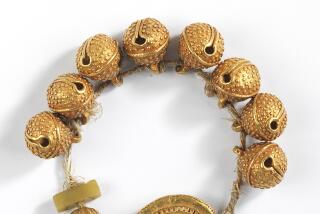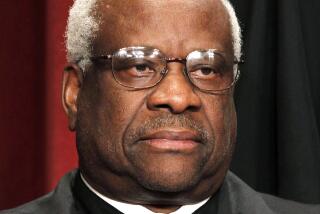Reporter’s Notebook : Out of Africa: Shultz and a Load of Gifts
WASHINGTON — When Secretary of State George P. Shultz returned early Thursday from a six-nation tour of Africa, his plane was loaded with gifts from African leaders ranging from intricately carved ivory to an amateurish portrait of him and his wife, Helena.
Shultz will keep very little of it. Some of the gifts may end up in the offices of small-town mayors who have never been near Africa.
Under U.S. law, officials may keep official gifts with a retail value in the United States of $165 or less. Most of the exotic African artwork that Shultz received would exceed that limit, officials said.
For gifts that are too valuable to take home, Shultz may choose to display them in his office or elsewhere in the State Department. That is considered “official use” and complies with the law. But one official said, “We don’t do that very much because his office would start to look like a museum.”
Items not wanted by the State Department are offered to other U.S. government agencies. If still unclaimed, they are made available to state and local governments.
Anything left over can be purchased by the recipient for the appraised value. And anything still left is put up for auction by the General Services Administration, although, the official said, “That’s very embarrassing.”
When the Shultz party arrived in Africa last week for stops in Kenya, Liberia, Nigeria, Cameroon, Ivory Coast and Senegal, it was handed a detailed list of tips on personal security that might have persuaded the timid to go right back home.
“If a thief gets a firm hold on your purse or handbag strap, do not attempt to hang on,” said the instructions, prepared by the U.S. Embassy in Dakar, Senegal. “You could be injured in the fall.”
Another helpful hint: “Be very suspicious of a vehicle full of men that attempts to involve you in a minor (auto) accident.”
As it turned out, there were no recorded purse-snatchings, kidnapings or other such incidents. The only thing that came close to extortion involved two reporters who hailed a taxi for a shopping trip in Abidjan, Ivory Coast, without negotiating a price in advance.
The driver showed them a very interesting market about 30 miles out of town, then refused even to consider starting the return trip until they had agreed to pay the equivalent of more than $100 for the ride.
By the time the Shultz plane touched down at Andrews Air Force Base outside Washington, it had covered 14,841 miles in a little more than nine days. The plane was in the air a little more than 36 hours.
The Air Force 707s that make up the U.S. government’s VIP fleet are virtually self-contained villages. On trips to Africa and other places where local food supplies are suspect, the plane brings from Washington all the in-flight meals that will be served on the trip, carrying most of it in a dry-ice freezer.
Telephone calls were expensive throughout West Africa, with charges of up to $10 a minute--payable in cash. Matthew C. Quinn, a writer for United Press International, was especially hard-pressed, being erroneously billed several times for calls he never made, touching off long arguments.
So it was not surprising that Quinn, when shown a piece of African art worth several thousand dollars, blurted out, “That’s almost as much as a telephone call.”
The movie image of a foreign correspondent pecking away at a battered portable typewriter has been overtaken by technology. These days virtually all reporters use portable word processors that can be used to transmit stories electronically over telephone lines to their home office.
The trouble is, the system works only when phone lines are clear, and they seldom are in Africa. Some reporters never succeeded in transmitting electronic copy; some were able to do so, albeit infrequently and with difficulty.
About 1 a.m. in the press room in Abidjan, Quinn was finally able to make a connection. Shortly after his transmission began, a distinguished-looking gentleman became curious about the process and picked up the computer to get a closer look, an action that could easily have broken the connection.
Quinn angrily told the man to put the machine down.
Later, an ashen-faced embassy employee told him, “That was the ambassador.”
More to Read
Sign up for Essential California
The most important California stories and recommendations in your inbox every morning.
You may occasionally receive promotional content from the Los Angeles Times.









